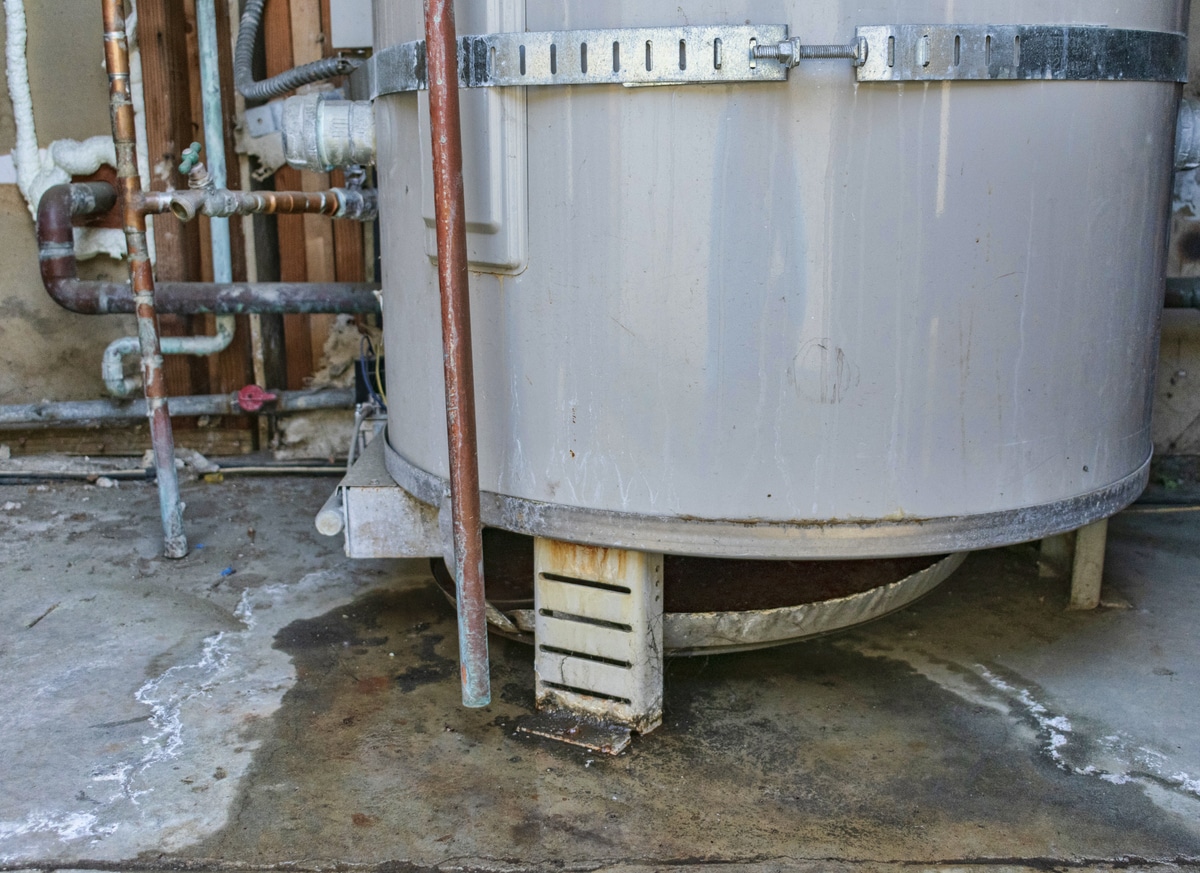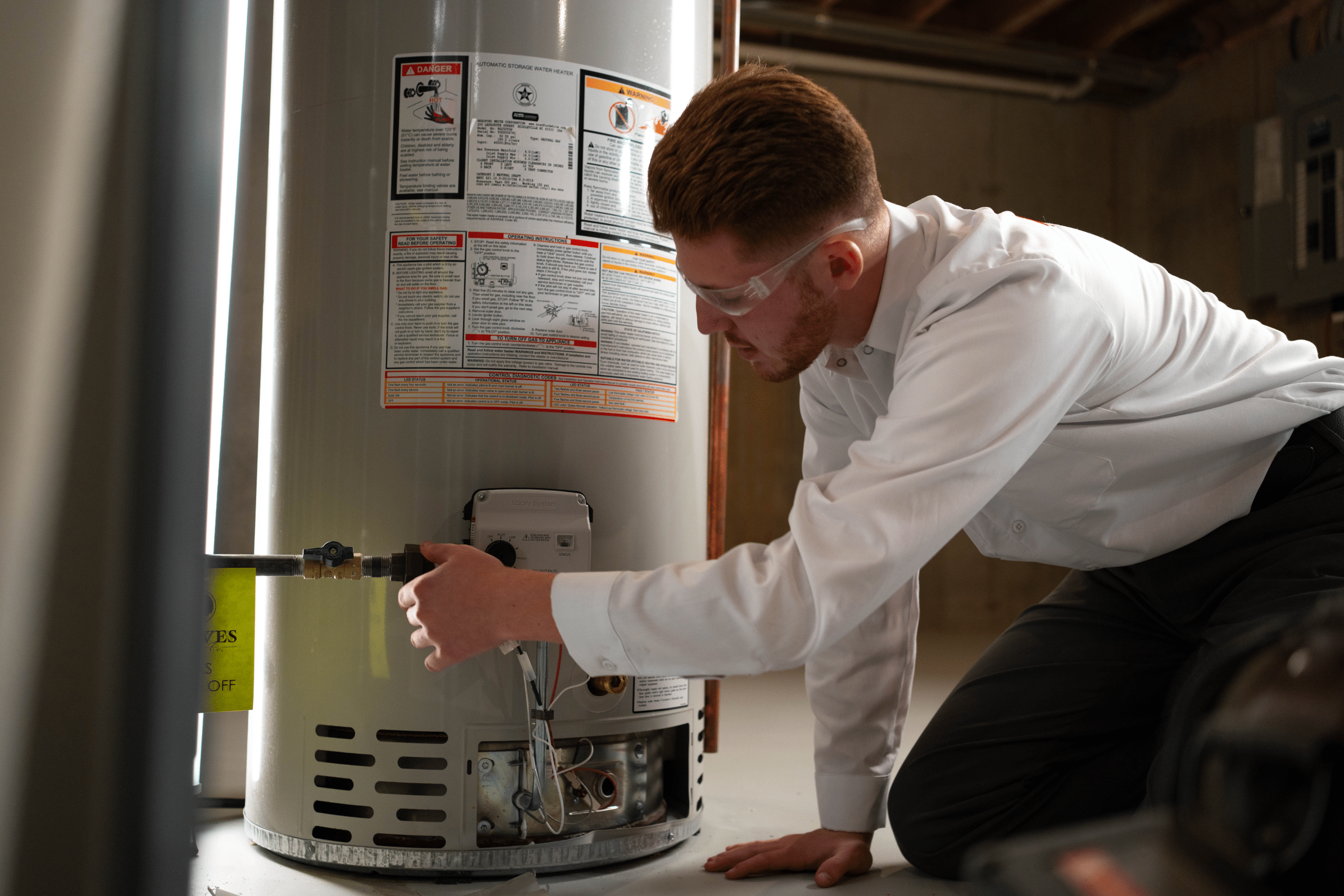Old water heaters can become unreliable and unsafe over time. It is important to understand when to upgrade to a new water heater and why professional water heater installation is recommended. In addition to safety, investing in an energy-efficient model can streamline your daily routines and reduce utility bills.
Table of Contents
- The Role of Your Water Heater
- What Causes A Hot Water Heater To Stop Working?
- Warning Signs You Need Water Heater Replacement
- Safety Concerns: Risks Of An Older Water Heater
- Benefits Of A New Water Heater
- Importance Of Hiring a Professional For Water Heater Installation
- FAQs
The Role of Your Water Heater
A water heater plays a vital role in a comfortable and safe household. When you shower or wash your dishes or laundry, your systems rely on your home’s water heater. However, in addition to helping you complete all of your household tasks, water heaters also contribute to the larger heating patterns in your home.

For instance, when the temperatures tank during winter, running hot water can reduce the odds that your pipes will freeze over. Many modern water heater models also have safety measures that prevent excessive pressure buildup, which can help protect the rest of your plumbing system from accidents.
Depending on the type of water heater, features like expansion tanks can help prevent leaks or damage to your pipes and are required in a majority of municipalities. You can utilize your water heating system for radiant heating, running warm water through the pipes to heat the floor during colder days.
Replacing your water heater when it begins to break down is essential. The longer you go without a water heater replacement in St. Louis, Nashville, or wherever you may live, the risk of safety hazards or property damage increases.
What Causes a Hot Water Heater to Stop Working?
The most common causes of water heater malfunctions include:
- Minerals: If your water has too much sediment, it will accumulate within the system over time. When it reaches a critical mass, it can interfere with the water heater’s heating elements.
- Broken thermostat: If the thermostat doesn’t work, the water heater will overheat or fail to heat entirely. This may not mean you need to replace the water heater, but it will be important to address it sooner.
- Leaks: Leaks in a water heater can damage the surrounding components, which can cause it to either slow down or shut down altogether. If your water heater tank is leaking from the bottom, this can mean that the underside has rusted and weakened and must be replaced. Water heater leaks can also cause extensive property damage if not corrected immediately.
- Element failure: The heating element is generally resilient against everyday stress but is not immune from burning out. If this occurs, the water will fail to heat.
- Rod failure: The anode rod is the mechanism that prevents rust from chipping away at the water heater tank. Should it fail, your tank may become damaged or begin to leak.
- Broken pilot: If the pilot light is continuously going out or won’t light at all, it won’t be able to light the main burner of the water heater, causing a lack of hot water in your home.
- Gas valve malfunction: A broken gas valve will either fail to provide enough power to the water heater or potentially shut it down altogether. The gas valve is a fundamental mechanism during the winter when you’ll need additional gas to make it through the colder months.
- Old age: The lifespan of a home hot water is typically eight to twelve years. However, the lifespan depends heavily on the model and the house’s overall demands.[1] A water heater in a high-demand home may burn out faster or experience more issues without proper water heater maintenance.
Warning Signs You Need Water Heater Replacement
Typically, a few tell-tale warning signs may appear before you need to replace your water heater. Here’s what to look for:
- Lack of hot water: If you find yourself without enough hot water to shower, it could indicate a clogged tank. The more sediment in the tank, the less capacity you’ll have overall. A lack of hot water can also mean that your thermostat is broken or, depending on your household’s size, your water heater tank is too small.[2]
- Higher utility bills: Malfunctioning heating elements or sediment buildup can put increasing strain on the water heater. You’ll end up spending more money on your water bills, typically while seeing a reduction in your appliance’s productivity.
- Discolored, rusty, or smelly water: Sediment can impact the quality of the water that flows from the tap, as things like rust can eat away at the protective liners of your water heater. You might notice that your water has a different smell or color thanks to the mineral deposits built up over time. If you use a filter, you should check your filters for consistency and volume changes.
- Noises: Clanging or banging is sometimes caused by sediment buildup. However, it can also indicate a problem with the water pipes. Unless you can clearly identify what’s causing the noise, it’s essential to have a professional check the issue to determine whether a water heater replacement could fix it.
- Leaks: Leaks may indicate a problem with your pipes or worn-out gaskets. Water heater leaks often start as minor, but this can change quickly. Diagnosing and treating the problem may be the difference between simple part replacements and a complete water heater replacement. Waiting to address a leaking water heater can also result in costly water damage to your property.
Safety Concerns: Risks Of An Older Water Heater
When you use your water heater every day- to bathe, wash your clothes, and clean your dishes- it’s essential to consider the risks of delaying the replacement of your water heater:

- Health: Rusty, discolored water is not necessarily a health hazard, even if it doesn’t look or taste good. More concerningly, a water heater in these conditions can play host to bacteria growth, which can occur without proper maintenance. While rare, you could put yourself and your family at risk of waterborne illnesses.
- Rupture: If the tank ruptures due to corrosion or excess pressure, it can create a sudden spout of water, which can damage your property and potentially burn anyone who happens to be near it when it goes off.
- Mold: Mold is not only an air pollutant; it can attract anything from insects to rodents.[3] If your tank is old, leaks can cause severe water damage to the property and, if not addressed, lead to anything from mildew to mold.
- Utility hazards: Whether your water heater is gas or electric, any malfunctioning components can create dangerous conditions for the people on the property. If the gas leaks or the wiring is compromised, it can lead to fires or even explosions. Older water heaters are often at risk for these hazards, as the connections and valves may have shifted over time.
Benefits Of A New Water Heater
A new water heater offers a host of benefits for a property owner, including:
- Safety features: As expected, technology has made water heaters more sophisticated. Modern appliances will typically turn off if they detect safety issues. They can also detect leaks so you can receive a near-instant warning of the problem.
- Better lifespans: Newer water heaters typically have longer lifespans than older models. Instead of needing a water heater replacement every ten years, you can extend that to fifteen years.
- Lower utility bills: Energy efficiency isn’t just good for the environment but also for your monthly expenses. You can expect to save more thanks to the insulation and modern heating elements that ensure you aren’t wasting any power when you run your water heater.
- Convenience: If your water heater is on-the-out, you’re likely used to turning on the tap and waiting a while for the water to heat up. Newer models have more efficient recovery rates, giving you hot water faster. For families that fight over who gets into the bathroom first, it can be an unexpected relief for the whole household. The water temperature provided by newer models is typically more consistent so that you won’t get those annoying (and sometimes dangerous) temperature swings from lukewarm to scalding.
- Quiet operation: Older water heaters were known for being noisy, even when new. Newer models are quieter and can be purchased with wi-fi connectivity, so you can monitor your heater even when you’re away.
- Better water quality: Newer models don’t just remove the rusty taste of your water; they usually have better filtration systems to remove more contaminants from your water.
- Fewer hassles: If you’re tired of dealing with service calls on your old water heater, newer models can save you time and energy. The smart models are especially recommended if you want to stay on top of your water heater’s performance.
Importance Of Hiring a Professional for Hot Water Heater Installation

A water heater replacement is more than just following a how-to video, especially if your water heater or property doesn’t follow standard protocol. For instance, if an amateur hooked up your water heater in the early 2010s and the previous owner attempted to fix the wiring at some point a decade later, you might be dealing with hazardous conditions that you aren’t even aware of.
Hiring professional installers will limit your liability and remove your chance of severe injury or property damage. With a professional plumber or technician, you can ensure that your water heater replacement will work properly from the moment it’s turned on. It’s important to have a licensed plumber pull the proper permits to ensure the installation meets all safety and code regulations, as most municipalities require permits for water heater installations. At Hoffmann Brothers, our team offers various servicing options, making it easy for our clients to avoid major repairs and safety hazards and enjoy peace of mind and fresh, hot water.
Frequently Asked Questions
A standard water heater can last anywhere from 8 to 12 years. Tankless water heaters can last more than 15 years.
Warning signs include higher utility bills, discolored water, rattling or knocking noises from the heater, and leaks. If your water heater is over ten years old, you should have a certified professional inspect it (even if it does not show signs of distress).
You may be eligible for federal, state, or local incentives to upgrade to an energy-efficient water heater. Remember that these programs can change, so check with your technician or local government entities for potential updates.
The cost to replace a water heater depends heavily on the size and type (e.g., tankless water heaters will typically cost more) and the professional installer you choose.



